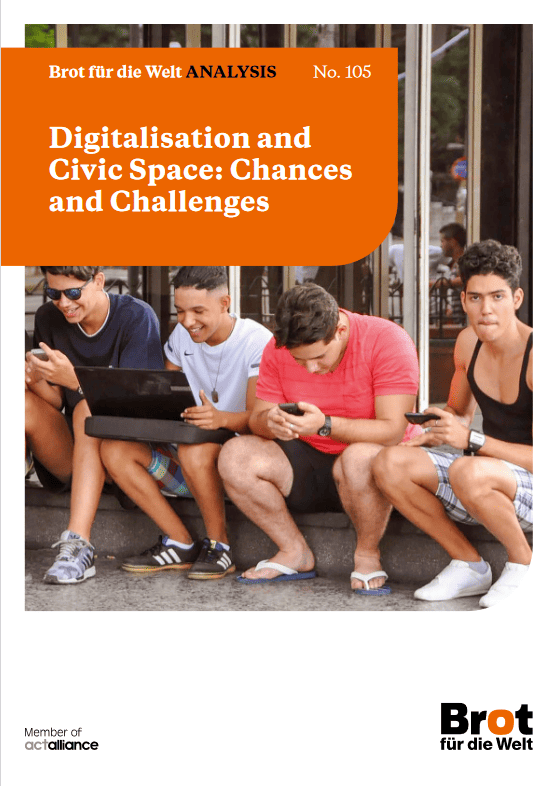Civil society organisations are increasingly suffering from restrictions and repression. Digitalisation makes it even easier for autocrats to censor opinions, to spy on and to repress people. Internet shutdowns have become a widespread tool to block people’s right to information. But digital tools also brought and bring opportunities for activists and CSOs: with the help of modern communication channels, they can inform, mobilise and network more directly and successfully. Digitalisation is still an important building block for sustainable development; provided that barriers to access are removed and human rights are respected.
In its fourth edition, the “Civil Society Atlas“, published by Brot für die Welt together with CIVICUS, analyses both opportunities and challenges that increased digitalisation poses to civil society and civic space. This is illustrated in four case studies, in Mexico, Indonesia, Tanzania, and Ukraine.
The report concludes with key demands addressed to policymakers, including the EU and its Member States. Promoting access to the internet for all and ensuring better export regulation for surveillance technologies and preservation of data protection are just a few examples of actions governments and parliamentarians must commit to ensure respect for human rights and enable an independent civil society – also in the digital space.
Summary
Civil society in the digital space
Multifaceted, uncensored, promoting democracy ‒ that is the internet, many people had long hoped. But from today’s perspective, this is not true ‒ or only partially. Because the big digital platforms and the World Wide Web are both: media of freedom and control. In many places, they support civil society, but often they also pose a massive threat to it.
On the one hand, civil society organisations, activists and bloggers use digital tools to organise their work and make it more efficient: Through them, they disseminate reports and campaigns and exchange information. On the other hand, governments restrict freedom of expression and the press through online censorship: They block access to certain websites or platforms or shut down the internet entirely and monitor activists and journalists with digital technologies, often made in Europe.
Policymakers, platforms and civil society face major challenges: They have to negotiate and decide how to deal with hate on the web and in social media without compromising freedom of expression. How more people, especially in the Global South, can get better access to the Internet. And, how the data collection frenzy of the big tech companies and the dangers posed to democracy by Facebook & Co can be contained. Civil society voices call for more human rights-based regulation and containment of digital capitalism.
Countries
Four country examples illustrate the opportunities, but also the challenges, for civil society engagement and fundamental freedoms in the digital space: In Mexico, numerous human rights defenders and journalists were monitored with the spy software Pegasus. In Indonesia, laws restrict freedom of expression on the internet and social media. In Tanzania, the day before the 2020 presidential elections, the government shut down the Internet for several days. And in eastern Ukraine, the spread of fake news contributed to the escalation of the conflict.
Surveillance in the digital space, censorship, internet shutdowns and disinformation violate fundamental freedoms. They make the work of our partner organisations more difficult and reduce their scope for action. But civil society is also using digital tools to defend itself against state repression. It builds networks and develops new formats to work more effectively.
The Brot für die Welt partner organisation Mental Health Service, for example, has used digital instruments to treat people traumatized by the war in eastern Ukraine. And in Indonesia, the organisation KontraS informs the public via social media despite restrictive IT laws and censorship, and exchanges information with other organisations through these channels. In this way, it also puts pressure on the government.
Our political demands
To ensure that human rights are respected and independent civil society is able to engage worldwide, policymakers must take action. Governments and parliaments must uncompromisingly commit to an independent civil society and universal human rights ‒ also in the digital space. Embassies should strengthen their efforts for human rights, their defenders and civil society.
The responsibility regarding human rights for political decision-makers begins with their own policies. They should ban the export of surveillance products except for individual case authorizations. They should ensure that algorithmic systems that make autonomous decisions or assist in decision-making are only introduced after a risk assessment and do not violate fundamental rights. In addition, development cooperation should promote access to the Internet for all.
Our political representatives should also advocate that banning individual services and shutting down the internet should be outlawed as human rights violations. At the global level, an international legal framework should be created that defines the duties of the states and the responsibilities that companies have in the digital space ‒ and which guarantees that these are in line with international human rights.
